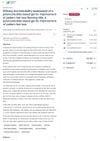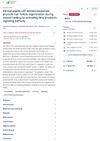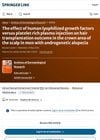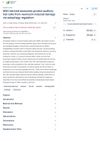September 2022 in “Research Square (Research Square)” 5% topical minoxidil improves hair density and quality in monilethrix patients.
[object Object] December 2022 in “Research Square (Research Square)” A multi-tiered treatment approach is crucial for managing hidradenitis suppurativa in patients with intellectual and developmental disorders.
Public awareness of finasteride's sexual side effects has increased, suggesting healthcare providers should discuss these risks more thoroughly with patients.
PRP treatment significantly increases hair density in men with androgenetic alopecia.
 8 citations,
March 2019 in “Open Biology”
8 citations,
March 2019 in “Open Biology” The document concludes that regenerating functional ectodermal organs like teeth and hair is promising for future therapies.
 December 2021 in “Research Square (Research Square)”
December 2021 in “Research Square (Research Square)” Hair follicle sampling is a feasible method to measure FMRP and FMR1 mRNA levels in children.
 April 2021 in “Research Square (Research Square)”
April 2021 in “Research Square (Research Square)” Achieving 80% or more scalp hair regrowth is considered a successful treatment for significant hair loss.
 August 2023 in “Research Square (Research Square)”
August 2023 in “Research Square (Research Square)” Personalized thiopurine dosing based on NUDT15 genotyping can improve long-term outcomes for ulcerative colitis and Crohn's disease patients.
 July 2022 in “Research Square (Research Square)”
July 2022 in “Research Square (Research Square)” Hair analysis can somewhat track past testosterone levels but is influenced by factors like hair washing, growth rate, sex, and hair color.
 September 2021 in “Research Square (Research Square)”
September 2021 in “Research Square (Research Square)” Not having enough or having too much of the protein Grainyhead-like 3 leads to various developmental problems.
 October 2021 in “Research Square (Research Square)”
October 2021 in “Research Square (Research Square)” Melatonin affects certain genes and pathways involved in cashmere goat hair growth.
 August 2021 in “Research Square (Research Square)”
August 2021 in “Research Square (Research Square)” Ferulic acid can reduce seizures and depression-like behaviors in catamenial epilepsy by balancing hormones and brain enzyme activity.
 August 2021 in “Research Square (Research Square)”
August 2021 in “Research Square (Research Square)” Borneol Essential Oil could be a natural and safe acne treatment.
 June 2021 in “Research Square (Research Square)”
June 2021 in “Research Square (Research Square)” The exact identity of skin stem cells and how skin cells differentiate is not fully known.
 June 2021 in “Research Square (Research Square)”
June 2021 in “Research Square (Research Square)” Melatonin can increase cashmere yield by altering gene expression and restarting the growth cycle early.
 June 2021 in “Research Square (Research Square)”
June 2021 in “Research Square (Research Square)” Adverse events in lung cancer treatments increase fear, anxiety, and depression, with newer therapies causing fewer side effects.
 May 2023 in “Research Square (Research Square)”
May 2023 in “Research Square (Research Square)” Wearing a hijab may lead to earlier hair loss due to vitamin D deficiency and scalp conditions.
 October 2023 in “Research Square (Research Square)”
October 2023 in “Research Square (Research Square)” Polynucleotide gel injections help reduce hair loss and increase hair thickness in people with pattern hair loss, with few side effects.
 February 2024 in “Research Square (Research Square)”
February 2024 in “Research Square (Research Square)” Tiny particles from skin cells can help grow new hair by activating a specific growth signal during skin healing.
 March 2022 in “Research Square (Research Square)”
March 2022 in “Research Square (Research Square)” The new method isolates more hair follicle stem cells from mice quickly and these cells help promote hair growth.
 November 2022 in “Research Square (Research Square)”
November 2022 in “Research Square (Research Square)” Keratin-associated proteins have ancient origins and were used for different purposes before being adapted for hair in mammals.
 2 citations,
March 2022 in “Research Square (Research Square)”
2 citations,
March 2022 in “Research Square (Research Square)” Seasonal changes affect gene activity linked to hair growth in Angora goats, influencing mohair quality.
 November 2020 in “Research Square (Research Square)”
November 2020 in “Research Square (Research Square)” Keratin injections in mice can stimulate hair growth and might help treat hair loss.
 May 2024 in “Archives of dermatological research”
May 2024 in “Archives of dermatological research” LGFs slightly improve hair transplant results more than PRP.
 April 2023 in “Research Square (Research Square)”
April 2023 in “Research Square (Research Square)” Exosomes protect ear hair cells from damage by controlling cell waste removal, potentially helping treat hearing loss.
June 2020 in “Research Square (Research Square)” Oral contraceptives with CPA improve overall quality of life for women with PCOS.
12 citations,
May 2009 in “Ophthalmic plastic and reconstructive surgery” Multiple pilomatrixoma may indicate Turner syndrome.
 April 2024 in “Research Square (Research Square)”
April 2024 in “Research Square (Research Square)” A 27-year-old with APS-1 showed improvement in symptoms after treatment.
 March 2021 in “Research Square (Research Square)”
March 2021 in “Research Square (Research Square)” The SbbHLH85 protein helps sweet sorghum grow more root hairs but makes the plant more sensitive to salt.
[object Object]  July 2022 in “Research Square (Research Square)”
July 2022 in “Research Square (Research Square)” Lower PPARγ levels and specific gene variations are linked to more severe Frontal Fibrosing Alopecia.























